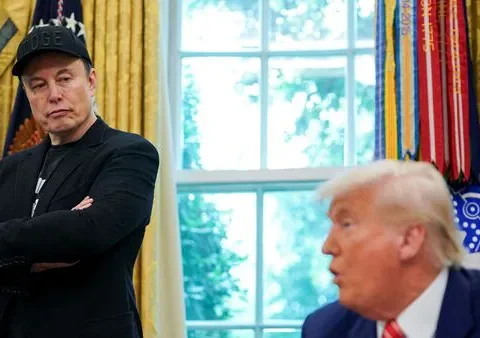In a striking display of loyalty, President Donald Trump has stood firmly by his National Security Adviser, Mike Waltz, despite Waltz’s role in accidentally disclosing sensitive military plans for Yemen airstrikes to a journalist, asserting that Waltz has “learned a lesson.”
The leak, which occurred via a Signal messaging group chat inadvertently including Jeffrey Goldberg, editor-in-chief of The Atlantic, exposed operational details just hours before U.S. strikes on Houthi targets on March 15.
Trump’s defense of Waltz, calling him a “good man” and downplaying the incident’s impact, has ignited a firestorm of debate over accountability, security protocols, and the administration’s handling of classified information. This article delves into the incident’s fallout, Trump’s response, and the broader implications for his second-term national security team.
The controversy erupted on March 25, 2025, when Goldberg’s explosive article in The Atlantic revealed how he was mistakenly added to the “Houthi PC Small Group” chat by Waltz on March 13. The group, including heavyweights like Defense Secretary Pete Hegseth, Vice President JD Vance, and Director of National Intelligence Tulsi Gabbard, discussed plans to bomb Houthi positions in Yemen.
Trump, speaking to NBC News on Tuesday, dismissed the breach’s significance, saying it had “no impact at all” on the operation’s success. Yet, the incident has drawn bipartisan criticism, calls for resignations, and an NSC investigation, spotlighting vulnerabilities in an administration barely two months into its term.
The Leak That Shook Washington
The saga began innocently enough with a Signal connection request from “Michael Waltz” to Goldberg on March 11. Skeptical, Goldberg assumed it was a hoax—until the chat turned to serious military planning two days later. As detailed by CNN, Hegseth texted specifics about targets, weapons, and timing, which unfolded precisely when bombs fell at 1:45 p.m. Eastern on March 15. Goldberg, stunned by the real-time confirmation, left the chat soon after, later calling it a “massive security breach” in his report. The NSC’s John Hughes confirmed the thread’s authenticity to NBC News, admitting it “appears to be” genuine.
The use of Signal—an encrypted but unclassified app—has fueled outrage. Legal experts cited by The New York Times suggest the chat could violate laws on handling national defense information, especially given its auto-delete settings, which may flout federal record-keeping mandates. “This isn’t just a mistake—it’s a systemic failure,” a former Pentagon official told CNN, highlighting how such details should stay within secure channels. The breach’s timing, hours before the strikes, raised hypothetical risks of enemy exploitation, though analysts on BBC agreed the short window likely prevented significant fallout.
Trump Stands By Mike Waltz Despite Disclosing Military Plans
Trump’s resolute stance—standing by Mike Waltz despite disclosing military plans and saying he’s “learned a lesson”—anchors the administration’s response. In his NBC News interview, Trump called Waltz a “good man” and framed the leak as a minor “glitch,” insisting the Yemen operation was “very effective.” Speaking to reporters on March 24, he’d initially claimed ignorance—“I don’t know anything about it”—but shifted to support after a Monday call with Waltz, per two sources cited by NBC News. On Truth Social, Trump doubled down, mocking The Atlantic as “not much of a magazine” and praising the strikes’ success.
This loyalty contrasts sharply with the administration’s critics. House Speaker Nancy Pelosi, on MSNBC, demanded a congressional probe, calling it a “breach of U.S. national security.” Senator Chuck Schumer echoed her on CNN, branding it “amateur hour” and targeting Waltz and Hegseth. Even some Republicans, like Senator Lindsey Graham on Fox News, sought a “full briefing,” though House Speaker Mike Johnson defended Waltz to Politico, saying he’s “exceptionally qualified” and shouldn’t resign. The divide reflects Trump’s polarizing influence, with allies closing ranks while detractors see incompetence.
Waltz Under Fire
Mike Waltz, a former Green Beret and Florida congressman tapped as Trump’s national security adviser in November 2024, now faces intense scrutiny. His military pedigree—27 years in the Army Special Forces, four Bronze Stars—won him Trump’s trust, as noted by Fox News when he was named. Yet, this incident has cast doubt on his judgment. The New York Times reported internal White House chatter about Waltz’s future, with one official telling Politico, “You can’t have recklessness as the national security adviser.” Another quipped he’s a “fucking idiot,” signaling deep frustration.
Waltz has stayed silent publicly, a choice drawing criticism. Hegseth, meanwhile, lashed out on Fox News from Hawaii on March 24, denying he texted war plans and calling Goldberg a “discredited journalist.” Goldberg fired back on CNN: “That’s a lie—he was texting war plans,” citing screenshots. The exchange has intensified calls for accountability, with The New York Times editorial board urging Hegseth’s resignation—an unlikely outcome given Trump’s backing of both men, per Reuters.
A Chat Room of Controversy
The “Houthi PC Small Group” chat itself offers a peek into Trump’s inner circle. Alongside Waltz, Hegseth, and Vance, it included Secretary of State Marco Rubio and Gabbard, per The Atlantic. Their discussion revealed not just military plans but internal dynamics—frustrations with “free-loading” European allies and a push for decisive action against Iran-backed Houthis disrupting Red Sea shipping. Waltz warned of risks if Israel struck first, while Hegseth pushed to “execute,” per Fox News excerpts. This hawkish tone aligns with Trump’s “America First” agenda, but the leak’s exposure of candid ally-bashing risks diplomatic strain, BBC analysts noted.
The chat’s platform choice—Signal—has drawn particular ire. While encrypted, it’s not a government-approved secure system, unlike those used for classified briefings. CNN reported that its use reflects a broader Trump team reliance on personal devices, a practice echoing controversies like Hillary Clinton’s email server—a point Clinton herself jabbed at on X: “You have got to be kidding me.” The irony hasn’t escaped critics, who see hypocrisy in past Republican attacks on such lapses, per NBC News.
Political and Global Fallout
Domestically, the leak has galvanized opposition. Democrats seized on it as evidence of chaos, with Pelosi and Schumer leading the charge for investigations. Republicans are split—some, like Johnson, defend Waltz, while isolationist voices on X question his “neocon” ties, suspecting deeper ties to Goldberg. Trump’s base, trending on X, shrugs it off as “4D chess,” with Elon Musk joking it’s fine since “no one reads The Atlantic”—a quip Trump amplified on Truth Social. Yet, congressional hearings loom, with Gabbard and CIA Director John Ratcliffe set to testify on March 26, per CNN.
Globally, the stakes are higher. The Yemen strikes targeted Houthi assets tied to Iran, part of a U.S. strategy to counter Tehran’s proxies. The chat’s leak of anti-European sentiment—“pathetic” allies—could fray NATO ties, per The Guardian, especially as unity against Iran falters. Neither Yemen nor Iran has commented, but Al Jazeera suggested adversaries might exploit perceived U.S. disarray. “This is unprecedented,” wrote The Atlantic’s Shane Harris, a view BBC echoed as a blow to American credibility.
What’s Next for Trump’s Team?
The administration’s response hinges on damage control. The NSC’s investigation, per NBC News, probes how Goldberg’s number entered Waltz’s contacts—possibly a staffer’s error, per Politico. Trump’s insistence on keeping Waltz and Hegseth suggests loyalty trumps optics, a pattern from his first term, Fox News analysts noted. Yet, the incident may force tighter protocols, with CNN predicting a shift to secure systems. Congress, meanwhile, seeks answers, with hearings poised to test the team’s resilience.
For Waltz, survival depends on Trump’s goodwill. His “lesson learned” may appease the president, but public and political trust is shakier. The Yemen operation’s success—disrupting Houthi attacks—bolsters Trump’s narrative, yet the leak’s shadow lingers. As one X user put it, “Sloppy start for a second term”—a sentiment that could define this saga’s legacy unless the administration regains control.
Focus Keywords: Trump supports Mike Waltz, national security leak, Yemen airstrikes disclosure, Mike Waltz Signal chat, Trump administration security breach

















